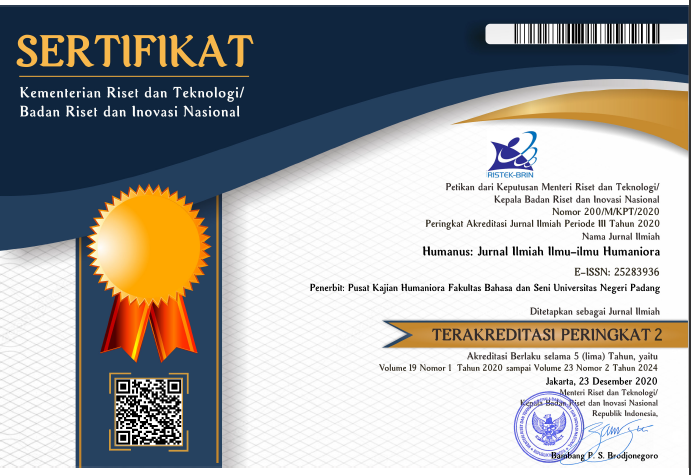NOVEL MANAH BUNGAH LENYAH DI TOYOBUNGKAH: GURU YANG BERDAMAI DENGAN ADAT
 ),
), (1)
 Corresponding Author
Corresponding Author
Copyright (c) 2016 Humanus
DOI : https://doi.org/10.24036/jh.v15i1.6413
Full Text:
 Language : id
Language : id
Abstract
THE NOVEL MANAH BUNGAH LENYAH DI TOYOBUNGKAH: A TEACHER WHO WANTS TO BE AT PEACE WITH TRADITIONAL CUSTOMS
Violence to the teachers is not only a national issue, but also has led to the criminal, even to the politicization of teachers. That fact can also be traced in the novel of Bali Modern Literature (BML/SBM) entitled Manah Bungah Lenyah in Toyobungkah 'Love is blossom, Wilt in Toyobungkah' (2002) by I Nyoman Manda. Here, the figures is depicted as a teacher of the only child of the family, both man and woman faces equal severity in the shackles of customs, traditions, and religion. Severity was associated with the process of inheritance that not only physical (scale) but also the spirit (noetic). In a dilemma that, with the status as teachers of single child families make peace with the customary shackles in order to save their respective families. Teachers succumb to glorify customary for the sake of harmonization. It is also confirmed that the fortress of Balinese culture in family hands were tied through the Bali banjar system in the territory of the indigenous villages. Families with a child much less work as teachers, are expected to be the pillar that is able to selectively filter out the various influences that want to destroy. Teacher is intended to strengthen the ranks into without shut out associated with changes (dynamics) society. Bali human identity should be maintained in accordance with the consistent discourse of Bali.
Key word: teachers, Modern Bali Literature, customs
Abstrak
Kekerasan terhadap guru bukan saja menjadi isu nasional, melainkan juga telah mengarah pada kriminalisasi, bahkan sampai pada politisasi guru. Kenyataan itu juga dapat ditelusuri dalam novel Sastra Bali Modern (SBM) berjudulManah Bungah Lenyah di Toyobungkah ‘Cinta Mekar, Layu di Toyobungkah’ (2002) karya I Nyoman Manda. Di sini, digambarkan tokoh guru dari keluarga berstatus anak tunggal baik laki-laki maupun perempuan sama peliknya dalam menghadapi belenggu adat, tradisi, dan agama. Kepelikan itu terkait dengan proses pewarisan yang tidak hanya bersifat fisik (sekala) tetapi juga spirit (niskala). Dalam posisi dilematis itulah, tokoh guru dari keluarga berstatus anak tunggal memilih berdamai dengan belenggu adat demi menyelamatkan keluarga masing-masing. Guru mengalah untuk memuliakan adat demi harmonisasi. Hal ini juga mengonfirmasi bahwa benteng kebudayaan Bali berada di tangan keluarga Bali yang diikat melalui sistem banjar di wilayah teritorial desa adat. Keluarga dengan anak tunggal lebih-lebih berprofesi sebagai guru, diharapkan menjadi pilar penyangga yang mampu menyaring secara selektif aneka pengaruh yang hendak menghancurkan. Guru diniatkan untuk memperkuat barisan ke dalam tanpa menutup diri keluar terkait dengan perubahan (dinamika) masyarakatnya. Jati diri manusia Bali harus tetap dijaga sesuai dengan wacana Ajeg Bali.
Kata Kunci: guru, sastra bali modern, adat
Keywords
References
Ardhi, Agung Wiyat S. 2004. Bukit Buung Bukit Mentik. Gianyar: Bhadrika Ashrama Keramas.
Baso, Ahmad. 2005, “Ke Arah Feminisme Postradisional” dalam Perempuan Multikultural Negosiasi dan Representasi. Depok: Desantara.
Basuki KS, Sunaryono. 2005. Sastra kita Numpang Nampang. Yogyakarta: Pinus dan Prasi.
Badra, I Wayan (Gde Srawana). 1978. Mlantjaran ka Sasak. Denpasar: Yayasan dharma Sastra.
Darma Putra, I Nyoman. 2006. “Seks Yes, Nikah No! Romantika Bali Bule dalam Teks Sastrawan Bali” (Makalah MPU II).
Darma Putra, I Nyoman. 2010. Tonggak Baru Sastra Bali Modern. Denpasar: Pustaka Larasan.
Dewantara, Ki Hadjar. 1994. Karya Ki Hadjar Dewantara Bagian II : Kebudayaan. Yogyakarta: Majelis Luhur Persatuan Taman Siswa.
Kaler. I Gusti Ketut. 1982. Butir-Butir Tercecer tentang Adat Bali 1. Denpasar: Bali Agung.
Kaler. I Gusti Ketut. 1983. Butir-Butir Tercecer tentang Adat Bali 2. Denpasar: Bali Agung.
Manda, I Nyoman. 2002. Manah Bungah Lenyah di Toyobungkah. Gianyar: Pondok Tebuwutu.
Ratna, Kutha I Nyoman. 2004. Teori, Metode, dan Penelitian Sastra. Yogyakarta: Pustaka Pelajar.
Tim Penyusun. 1978. Kamus Bali – Indonesia. Denpasar : Dinas Pengajaran Provinsi Bali.
 Article Metrics
Article Metrics
 Abstract Views : 553 times
Abstract Views : 553 times
 PDF (Bahasa Indonesia) Downloaded : 144 times
PDF (Bahasa Indonesia) Downloaded : 144 times
Refbacks
- There are currently no refbacks.
Copyright (c) 2016 Humanus










